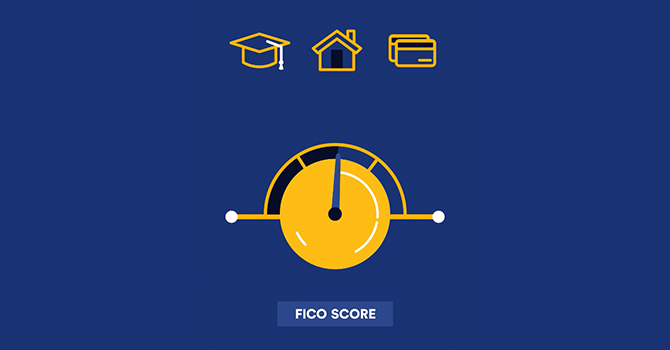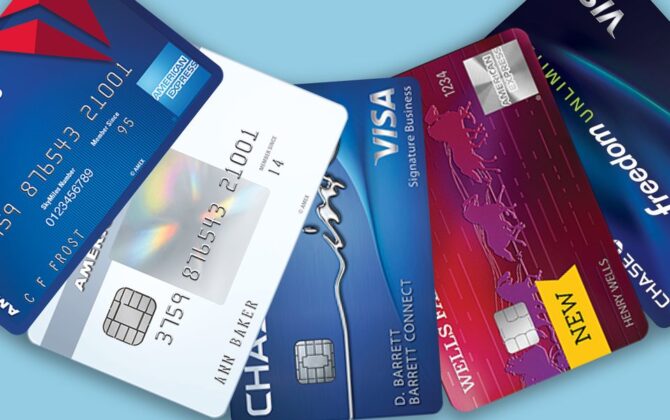Your credit score is the number financial institutions use to determine if you’re a good candidate for a loan or credit card. The higher your score, the less potential risk you pose to a lender and the more likely you are to get approved for a loan or credit card. With a higher credit score, you could also qualify you for lower interest rates.
Several factors go into calculating your credit score, including your payment history and amount of debt. Because your credit score can impact many short- and long-term financial goals, such as buying a home, it’s important to understand the elements that contribute to your score. Let’s look at some ways you can improve your credit score as well as how it’s calculated:
5 Steps to Improve Your Credit Score
If you’re looking to improve your credit score, here are some steps you can take:
1. Check your credit report for errors
Checking your credit report regularly lets you stay on top of your finances and ensure everything is accurate. You are entitled to a free credit report once per year from each of the three major credit bureaus (Experian, Equifax, and TransUnion). If you see anything that looks wrong, such as an account that doesn’t belong to you or an incorrect credit limit, you can dispute it.
2. Reduce the debt you owe
Most people know that paying their bills on time is important for maintaining a good credit score. This shows creditors that you’re a responsible borrower and helps to build your score over time. What many people don’t realize is that even if you’re making payments on time, having revolving debt can affect your credit score.
Revolving debt, or the balance you carry on any revolving lines of credit, like credit cards, can significantly impact your credit utilization ratio, which is the amount of debt you owe compared to your overall credit limit. By reducing the amount you owe on your credit cards, you can significantly lower your credit utilization ratio and improve your credit score.
3. Keep old accounts open
Your length of credit history impacts your credit score. Therefore, it’s important to keep established accounts open. Closing an older account lowers the average age of your credit accounts, which can hurt your score. So even if you’re not using an old card anymore, it’s usually best to keep it open.
4. Rate shop with soft credit checks
A soft credit check, or soft credit pull, is a credit inquiry that isn’t linked to a specific application for credit, like a pre-approval for a credit card or when an employer conducts a background check. Soft inquiries don’t impact your credit score, whereas hard inquiries, which happen when you apply directly for a new line of credit, may lower your score slightly for a short amount of time.
When looking for a new line of credit, compare rates with soft credit checks and pre-approvals rather than full applications. Rate shopping is a great way to get the best deal on a mortgage, credit card, or student loan refinance—it allows you to learn what different lenders are offering without having to go through the full application process. This can save you money on interest, and you won’t have to worry about multiple hard inquiries affecting your credit score.
5. Apply for new credit only as needed
Opening a new line of credit can have a small impact on your credit score. This can be for a few reasons, including a hard inquiry on your account or the average age of your accounts. A minor credit score dip shouldn’t keep you from applying for a mortgage or refinancing your student loans, but it’s something to keep in mind when considering opening a new line of credit.
How your credit score is calculated
FICO scores are the most widely used credit scores. These scores range from 300 to 850, and the higher your score, the less risk you present to lenders. Here’s a breakdown of the primary factors that go into your FICO score, along with tips on how to improve each one:

Payment history (35%):
This is the most important factor in your FICO score. Lenders want to see that you have a history of making on-time payments, so late payments will damage your score. To improve your payment history, continue to pay your bills on time.
Credit utilization (30%):
This refers to the amount of debt you’re carrying compared to your credit limits. Lenders like to see that you’re using a small portion of your available credit, so maxing out your credit cards will damage your score. To improve your credit utilization, use less than 30% of your total credit limit.
Credit history length (15%):
A longer credit history indicates responsible borrowing behavior over time, so having a long credit history will boost your score. If you don’t have a long credit history, there’s not much you can do about this factor except to be patient and continue using credit responsibly.
Credit mix (10%):
This refers to the variety of credit accounts you have, including revolving accounts like credit cards and installment loans like mortgages or auto loans. Lenders generally see a mix of different types of accounts as positive.
New credit (10%):
Whenever you open a new account or get an inquiry from a lender, it can ding your score slightly. A lot of recent activity, such as opening several new accounts, can also signal risk to a lender and impact your credit score. If you’re planning on applying for a loan soon, try not to open any new accounts or get any new inquiries in the months leading up to your application.
Keep track of your credit score
It’s important to keep tabs on your credit score. Fortunately, there are a few easy ways to do that.
You can get your full credit report from each of the three major credit bureaus: Experian, Equifax, and TransUnion. You’re entitled to one free report from each bureau every year. You can pull them all at once or stagger them throughout the year to check on your credit more frequently.
Many banks and credit card issuers offer ongoing credit monitoring. This allows you to see your score and some of the factors affecting it any time you want. These scores are updated monthly, so you’ll immediately know if there’s any activity on your account that could signal identity theft.
Improving your credit score can take time and patience, but it’s worth the effort. Watch this quick video to learn more about your FICO score and why it matters.
How long does it take to rebuild a credit score?
If you’re trying to rebuild your credit, you might wonder how long it will take to see results. The answer depends on several factors, including your starting credit score and which steps you take to improve it. However, there are some general guidelines you can follow. If you don’t have a long credit history or you’re building credit for the first time, it may only take a couple of months. On the other hand, if you’re trying to rebuild after a bankruptcy or foreclosure, it could take much longer—sometimes up to several years. The important thing is to stay patient and keep up with your payments, and eventually, you should see your score begin to rise.
Maintain good credit habits
Keeping your credit in check requires ongoing diligence.




